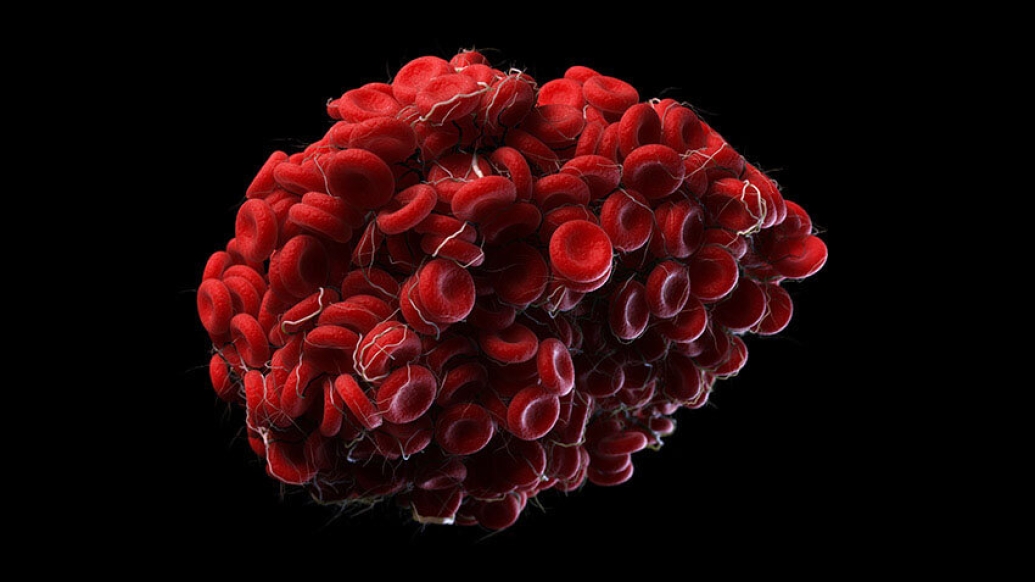Vascular experts are wading through a constant stream of data to continue refining the best approaches to avoid dangerous thrombosis events in people sick with the novel coronavirus.
5:00 AM
Author |

It seems like every week new data comes out about blood clots in patients with COVID-19. Thrombosis puts someone hospitalized for COVID-19 more at risk for more problems like stroke or organ failure, while their body's already dealing with inflammation from fighting the virus.
"The risk of thrombosis is real, it's important and it's something we need to be concerned about," says vascular cardiologist Geoffrey Barnes, M.D., M.Sc., who sees patients at the Michigan Medicine Frankel Cardiovascular Center. He served as lead author on the Anticoagulation Forum Guidance Document.
The challenge, Barnes says, is whether, or to what extent, to change treatment approaches based on constant streams of limited data. While he'd prefer to have robust prospective data on this particular issue, clinician-scientists like Barnes instead have to rely on standards for intensive care treatment and acute respiratory distress syndrome as they sift through the flood of observational data.
Prevalence reports on blood clots and COVID-19 continue to change
Barnes says initial reports out of China and then the Netherlands showed rates up to near half of patients with venous thromboembolism, but follow-up data from U.S. institutions showed much lower rates.
SEE ALSO: Seeking Medical Care During COVID-19
"The real number is probably somewhere in between," he says. "The severity of disease is really driving who will develop thrombosis. We currently use a low-dose heparin infusion as an intermediate approach in the ICU based on data from the H1N1 pandemic."
Andrea Obi, M.D., a vascular surgeon and assistant professor at Michigan Medicine, was lead author of a recent review that explains the observed relationship between inflammation and thrombosis in COVID-19, finding that there is a link between immune system induced inflammatory response and blood clotting in the small and large blood vessels.
MORE FROM THE LAB: Subscribe to our weekly newsletter
Levels of D-dimer, a protein biomarker generally measured to rule out blood clots, are markedly elevated in the COVID-19 patients with severe illness, she adds. Whether these patients could benefit from receiving blood thinners to improve outcome of the disease as had been useful in other severe pandemic pneumonias remains an active area of investigation.
"We're closely monitoring our patients with COVID-19 for blood clots in order to best determine if and when to flip the switch from preventive to therapeutic anticoagulation," Obi says.
Latest data confirms role for anticoagulation in treatment of COVID-related blood clots
The National Institutes of Health recently released interim data and promoted two main takeaways: moderately sick people with COVID-19 infection did better when they took full-dose blood thinners, but the sickest patients already in intensive care for COVID-19-related illness don't do well with the full dose.
The severity of disease is really driving who will develop thrombosis.Geoffrey Barnes, M.D., M.Sc.
And on the other end of the spectrum, a recent publication out of Michigan Medicine reported that patients who had worse cases of COVID-19 that required ventilator support had an imbalance in their bleeding-clotting system that increased the risk of bleeding.
SEE ALSO: Subset of COVID-19 Patients Have Increased Bleeding Risk
It's an assessment that makes sense to Barnes, also an assistant professor of internal medicine.
"I can hypothesize why the high risk patients were harmed: they may have had more bleeding risk and a more inflammatory component of thrombosis with critical illness, but we need more data to learn about this," Barnes says. "I continue to be hesitant about drastic clinical changes before more data from randomized clinical trials are peer-reviewed and published."
More than 45 randomized controlled trials have been started to evaluate anticoagulation in COVID-19, he says, but in the meantime, today's patients need the best care possible.
Preventing clots in patients hospitalized for COVID-19
"While I've been a proponent of standard or mildly increased venous thromboembolism prophylaxis regimens for hospitalized patients with COVID-19 for nearly a year, I'm starting to re-assess that position," Barnes says. "The early results from three clinical trials coordinated by the NIH have me considering which patients might benefit from full treatment doses of anticoagulation, even if they don't have a confirmed VTE event."
Like Podcasts? Add the Michigan Medicine News Break on iTunes or anywhere you listen to podcasts.
"Certainly, every hospitalized patient with COVID-19 needs to be receiving prophylaxis while we wait for the complete trial data to be released," he adds. And it's important to consider disparate outcomes in patients of color diagnosed with COVID-19 when making these individual treatment plans.
After patients leave the hospital, Barnes says data from London, Boston and New Orleans showed low rates of VTE. This is in contrast to initial numbers he'd reviewed that made him more concerned about this possibility.
"This tells me we do not need to be using universal prophylaxis after people leave the hospital," he says. "We can be pretty selective."
Patients managing COVID-19 infection at home
Most people infected with the virus don't need to go to the hospital at all, though.
Data from Mass General Brigham Health System shows low rates of venous thromboembolism in non-hospitalized patients, Barnes explains, which jives with his treatment approach.
"I am not using VTE prophylaxis in my outpatients if they're diagnosed with COVID-19. Rather, I'm only using it as an opportunity to reassess whether they should have been on blood thinners already, such as in the case of a patient who has a history of VTE," Barnes says.

Explore a variety of healthcare news & stories by visiting the Health Lab home page for more articles.

Department of Communication at Michigan Medicine
Want top health & research news weekly? Sign up for Health Lab’s newsletters today!





